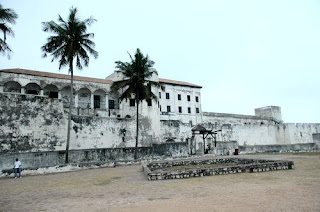PLease endeavour to share this post.
15 Africa travel tips (not related to bandits, thugs and murder):
1. Take only one bag. “Suitcases are for suits, check-in for suckers” as my well-heeled friend Jan Chipchase points out. My choice is the Northface Heckler backpack (in black). It’s got a convenient sleeve for my computer, and plenty of room for the camera and other items – your mileage will vary.
2. Pack less. This is what makes #1 work. You’re going to be tempted to pack for every eventuality. Don’t. only to find out when you get there that you only need 1/3 of what you brought.
3. Carry a power bar. Usually you can find food wherever you are, however for the small cost in space having something handy that gives you some energy and that you can trust to not get a stomach bug over, this is my first choice.
4. For the techies… USB devices are great for transferring information, applications and pictures use one. However, remember that there are no condoms for USB devices and that every PC and internet cafe device should be treated as a pox-ridden carrier of digital STDs for your virgin device. Keep it faithful to only your computer (and vice versa).
5. Paperbacks trump hardbacks. There’s a lot of waiting around when traveling, which makes it nice to have a book handy.
6. On mobile phones. You have two choices on your phone. a) buy a cheap one when you get there ($20-40) and get a local SIM card. b) get an unlocked phone before you leave and just buy a SIM card when you hit the ground. For multi-country travel I suggest going with “b”, which is what I do. If you lose a lot of phones, or are terrified of being robbed, go with “a”.
7. Bargain for everything. Have a great conversation with the first seller of whatever service or product you’re interested in. Never buy from that person. Instead, figure out exactly where the line is and then haggle harder with the next vendor, tout or merchant. (How can I state this delicately…? If you’re paying 25% of the asking price, you’re still being ripped off.)
8. On Cameras. A lot could be written about this, but suffice it to say that smaller is better unless you really like to take good pictures. I would suggest something that is waterproof. My personal favorite is the Sanyo Xacti – I love this thing. However, I could equally suggest getting something that runs off just a couple AA batteries. (Pros and Prosumers who, like me, carry a larger body DSLR ignore this one. You have your own rules to live by).
9. Spread your money out. Never carry all your money in one place. This isn’t just for security reasons, its for bargaining as well. I suggest carrying varying amounts of cash in 3 different spots and knowing what the amounts are so that you never pull out too much.
10. Eat local. This is especially true if you’re going on the cheap, don’t be afraid to eat the cooked foods at the road-side kiosks. You’ll see me regularly eating beans and chapatis on the streets of Nairobi for lunch. At $.50 I’m getting a good full meal and I can do it in a hurry if need be. If that’s too adventurous for you, you can choose other local spots, just don’t fall into the trap of thinking that you have to eat at the “westernized” establishments.
11. Mosquitos are made in hell and must be killed. I could write a whole post on the epic battles I’ve had with these satanic insects. Buy a can of Doom (insect spray), get insect repellent, sit on the smoky side of the fire, use a mosquito net – whatever it takes. My favorite way to kill them is a wadded up t-shirt as it has a wide area of impact – if you’re good you can smash them up against the wall/ceiling from a good distance away.
12. Remember your power adapter. Know what the outlets are going to be like where you’re going so you can recharge your computer and/or camera. Not knowing where you’re going, I would suggest this one – though a little big, it does fit almost everywhere you’re likely to travel.
13. Watches are overrated. It’s just one more thing to carry, use your cell phone for the time. Time doesn’t matter as much anyway to be honest… I haven’t worn one for years, but it could be I’m missing something here.
14. Drink a lot. I’m not going to get into it on whether you drink bottled water, sodas, beer or tap water – just make sure you’re drinking. You’ll end up sweating more, walking more and not realizing just how dehydrated you are until you notice that you haven’t gone to the restroom all day.
15. Toss out your expectations, embrace the differences. It’s not all going to fit the “standard” (as I reminded myself when I nearly bashed my skull in) that you think it should be. Just roll with it and keep a light-approach to life. When something goes wrong, which it will, remember that a smile, a shake of your head and a laugh will take you a lot further than the angry, frustrated and shouting “white person in Africa act” will.
The bonus tip is this: make friends locally and listen to them. They know the area and can point you towards people and places that you’ll get a lot out of. They also know most of the dangerous and dark corners of the region that you should stay away from, which Kristof talks of. People, at the end of the day, are your greatest assets when traveling, not your gear, knowledge or prior experience in the region.
Source: www.whiteafrican.com


















